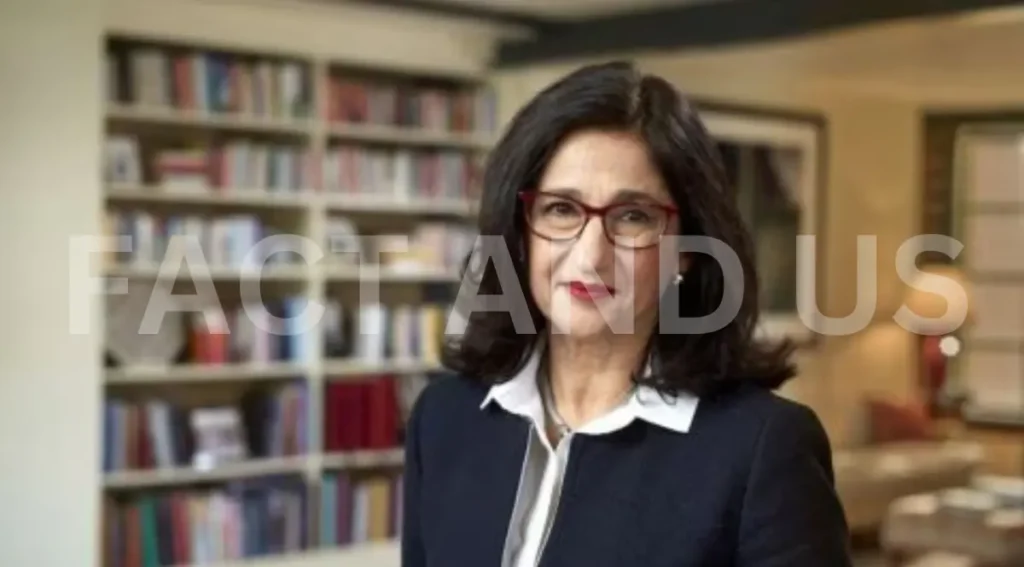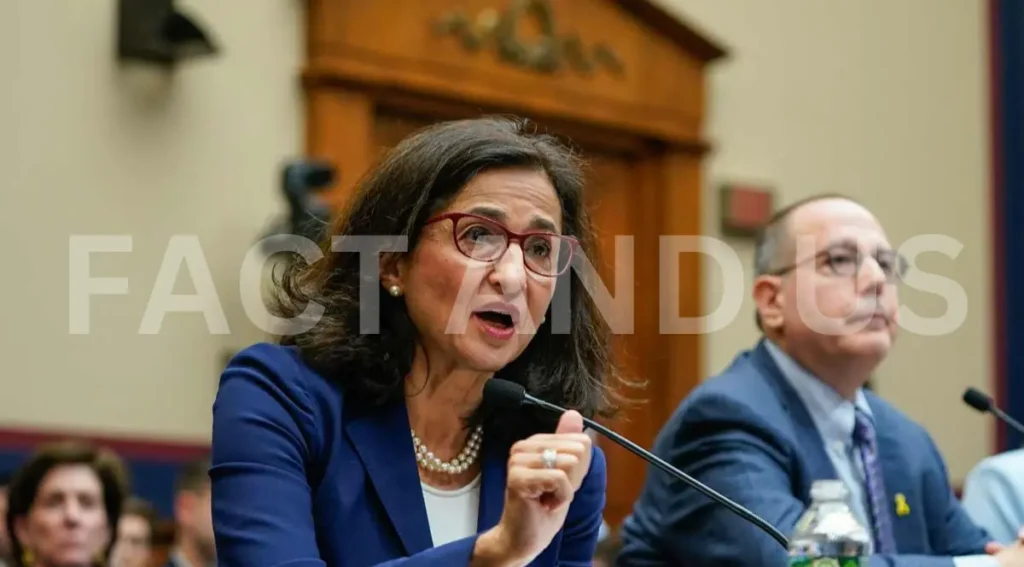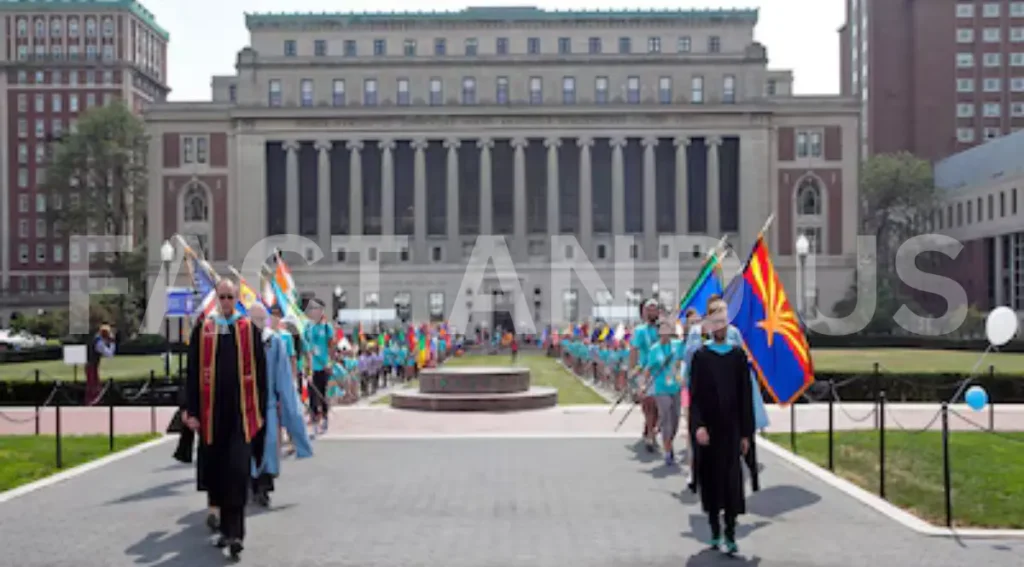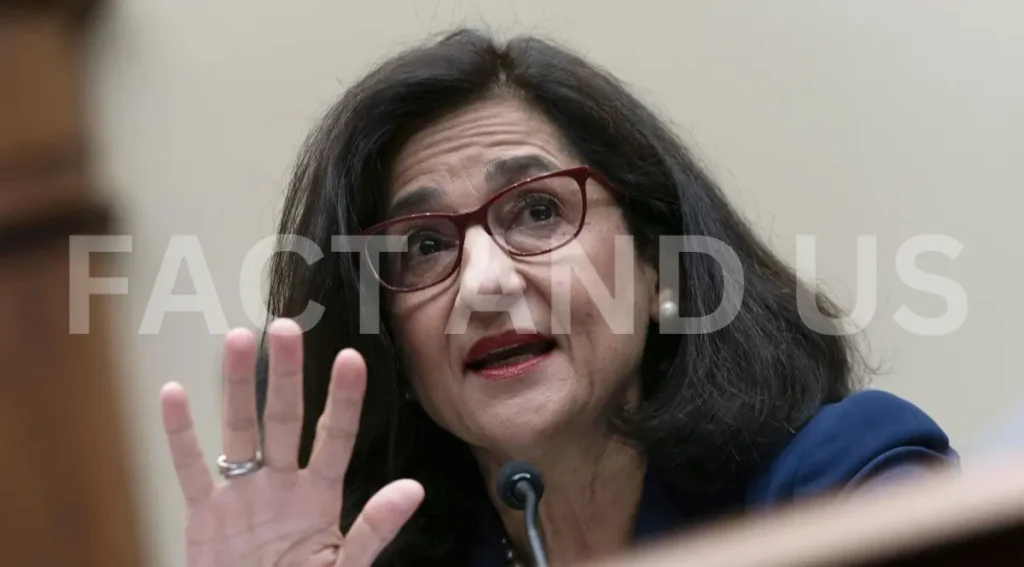Columbia University President Manouchehr Shafik has resigned from her position, four months after the institution was rocked by campus protests over the war in Gaza.

MS Shafik’s resignation comes only a year after she took the position at the private Ivy League university in New York City, and just a few weeks before the autumn semester is due to begin. MS Shafik is now the third president of an Ivy League university to resign over her handling of Gaza war protests.
In April, Ms Shafik authorised New York Police Department officers to swarm the campus, a controversial decision that led to the arrests of about 100 students who were occupying a university building. The episode marked the first time that mass arrests had been made on Columbia’s campus since Vietnam War protests more than five decades ago.
The move inflamed other protests at dozens of colleges across the United States and Canada.
In an email to students and faculty on Wednesday, Ms Shafik wrote that she has overseen a “period of turmoil where it has been difficult to overcome divergent views across our community”.
“This period has taken a considerable toll on my family, as it has for others in our community.”
Katrina Armstrong, chief executive officer of the Columbia University Irving Medical Center, will serve as the interim president.

“Over the summer, I have been able to reflect and have decided that my moving on at this point would best enable Columbia to traverse the challenges ahead,” Ms Shafik wrote in her letter.
“I have tried to navigate a path that upholds academic principles and treats everyone with fairness and compassion,” she continued.
university president
“It has been distressing – for the community, for me as president and on a personal level – to find myself, colleagues, and students the subject of threats and abuse.” In a statement, the university’s board of trustees co-chairs said: “Minouche has contributed so much to the Columbia community in an extraordinarily challenging time.” “While we are disappointed to see her leave us, we understand and respect her decision.” Students’ anger over how Israel is fighting its war against Hamas has raised fraught questions for university leaders, who are already struggling with combustive campus debates around what is happening in the Middle East.
US college campuses have been a flashpoint for Gaza war protests since Hamas attacked Israel on 7 October, and Israel’s subsequent incursion into the Gaza Strip. The leaders of Harvard University, University of Pennsylvania (UPenn) and the Massachusetts Institute of Technology all testified before the House Committee on Education and the Workforce. The presidents of Harvard and UPenn ultimately resigned amid backlash over their handling of campus protests and congressional testimony, including their refusal to say that calling for the deaths of Jews could violate university policy Republican House Speaker Mike Johnson, a fierce critic of the pro-Palestinian demonstrations on US campuses, welcomed the news on X, formerly Twitter.

“I stood in President Shafik’s office in April and told her to resign, and while it is long overdue, we welcome today’s news,” he said. “Jewish students at Columbia beginning this school year should breathe a sigh of relief.”Shafik was also among the university leaders called for questioning before Congress earlier this year. She was heavily criticised by Republicans who accused her of not doing enough to combat concerns about antisemitism on Columbia’s campus.
In her letter announcing her resignation, Shafik heralded progress in a number of important areas but lamented that her tenure had also been a period of turmoil where it has been difficult to overcome divergent views across our community. In her statement, she acknowledged the campus protests factored into her decision to resign. This period has taken a considerable toll on my family, as it has for others in the community, Shafik wrote. Over the summer, I have been able to reflect and have decided that my moving on at this point would best enable Columbia to traverse the challenges ahead.”
Shafik said she will return to the United Kingdom to lead an effort by the foreign secretary’s office reviewing the government’s approach to international development and how to improve capability.
I am very pleased and appreciative that this will afford me the opportunity to return to work on fighting global poverty and promoting sustainable development, areas of lifelong interest to me, she wrote. It also enables me to return to the House of Lords to reengage with the important legislative agenda put forth by the new UK government.
The Board of Trustees announced that Katrina Armstrong, the CEO of Columbia University Irving Medical Center, agreed to serve as interim president. The board said Armstrong, who is also the executive vice president for the university’s Health and Biomedical Sciences, “is the right leader for this moment”. Armstrong said she was deeply honored to be leading the university at a pivotal moment for Columbia.

Challenging times present both the opportunity and the responsibility for serious leadership to emerge from every group and individual within a community, Armstrong wrote. This is such a time at Columbia. As I step into this role, I am acutely aware of the trials the University has faced over the past year.
Shafik was named president of the university last year and was the first woman to take on the role, and she was one of several women newly appointed to take the reins at Ivy League institutions.
She had previously led the London School of Economics and before that worked at the World Bank, where she rose through the ranks to become the bank’s youngest-ever vice president. Shafik also worked at the United Kingdom’s Department for International Development, followed by stints at the International Monetary Fund and the Bank of England.
At the time of Shafik’s appointment, Columbia Board of Trustees chair Jonathan Lavine described her as a leader who deeply understood the academy and the world beyond it.
What set Minouche apart as a candidate, Lavine had said in a statement, is her unshakable confidence in the vital role institutions of higher education can and must play in solving the world’s most complex problems.
Stay connected with Fact and US for more such news.
